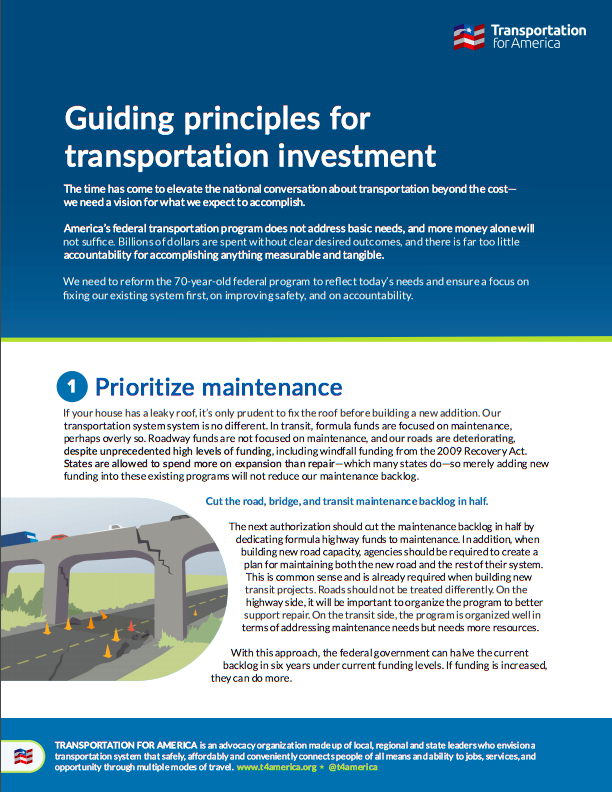The NTSB recommends safety standards for AVs. But Congress isn’t listening.
The National Transportation Safety Board (NTSB) found in two investigations that the lack of safety standards contributed to fatal automated vehicle crashes. And polling shows that Americans overwhelmingly want these safety standards. There’s both evidence that safety standards are needed, and a desire among the public to establish them: so why isn’t Congress including safety standards in its draft automated vehicle (AV) legislation?
Here’s how senators can turn their support for transit into real policy
At a Congressional hearing earlier this week, senators on both sides of the aisle expressed support for funding public transportation. As they begin to prepare legislation, we have six ideas on how to guarantee that transit is a priority.
We’re going to need a second Infrastructure Forum
This past Sunday, four presidential candidates gathered in Las Vegas to talk about infrastructure. It was a rare opportunity to ask the politicians vying for our nation’s top office critical questions—and the moderators completely blew it.
Rose Lanes get love from Portland City Council
The Portland City Council is moving forward with a plan to improve transit service through a series of targeted improvements to some of the city’s most delayed bus and streetcar corridors. Known as the Rose Lane Project, it’s designed to advance equity, reduce carbon emissions, and increase transit ridership with quick-build projects. It also offers lessons to other cities struggling with sluggish transit systems mired in a sea of cars.
Transportation is changing, but curbs are not: Lessons from the first Smart Cities Collaborative 2020 meeting
The third year of the Smart Cities Collaborative is off to a strong start. Last week, Transportation for America brought together the three pilot cities in the Collaborative to work through devising and designing strong curbside management pilots.
Step 1: Electric vehicle chargers. Step 2: Real structural reform.
Last week, Representatives Alexandria Ocasio-Cortez (NY-14) and Andy Levin (MI-9) released the “Electric Vehicle Freedom Act,” a bill that would aim to “establish a nationwide electric vehicle charging network within five years.” The creativity behind this bill is exactly what Congress needs—we just need to focus on more than EVs.
What’s inside presidential candidates’ transportation plans?
Our director Beth Osborne often jokes that transportation is the first agenda item on politicians’ second to-do list—which is why it never gets done. Most presidential candidates are no different, advocating for business-as-usual transportation funding or embedding transportation across multiple plans. Here’s what’s in them.
“This budget is disappointing but not surprising”: T4America statement on President Trump’s 2021 budget request
“With enormous potential to reshape the way Congress and the public think about transportation policy, the President’s FY 2021 budget follows his past budgets, cutting transit, rail and safety for those walking and biking while stressing highway funds require no accountability.”
Is this flurry of transit grants a blip or a trend?
The U.S. Department of Transportation has finalized five grants to expand and build new transit lines. It’s a stark departure from USDOT’s history of stonewalling grants under Trump. Could this surge of grants signal a shift in the agency’s stance? Perhaps. But it does highlight how our federal transportation system is structured to make transit hard to fund and why Congress should work to increase transit funding levels and certainty in new, long-term transportation policy that is currently being drafted. New transportation policy principles released in the House suggest that could be possible.
House environment coalition demands real transportation policy reform to tackle climate change
Last week, leaders of the House Sustainable Energy and Environment Coalition (SEEC) urged Transportation and Infrastructure Committee Chairman Peter DeFazio and Ranking Member Sam Graves to use surface transportation reauthorization as an opportunity to take serious action on climate change.





